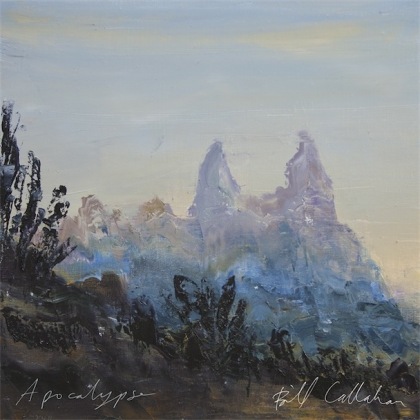Bill Callahan is releasing just his third album under his given name, after a wealth of material under the Smog moniker. The strange thing, though, is that Apocalypse almost feels like a band effort, with the backing arrangements taking some of the focus away from Callahan’s free-flowing poetry. Opener “Drover” finds Callahan joined by electric guitar squeals, uneasy drum fills, and campfire fiddles that embody the Western range that he uses to setup his metaphor, while feeling deconstructive enough to match his sentiment. “America!” (whose exclamation mark is fully necessary) gets a rogue electric guitar skidding out all over Callahan’s not-so-subtle social critiques. Yes, Apocalypse often feels less like a solo album and more like an album from a band called Smog.
And although parts of Apocalypse feel like the voice of a group, Callahan’s thoughts linger on the solitary. The is perhaps a reason he has stuck with the solo gig for nearly two decades. “One thing about this wild wild country,” Callahan repeats on “Drover,” going away from the herd to make his own point, “it takes a strong strong, it breaks a strong strong mind.” This is on the same song that leads of the album with “the real people going away” and sees the singer “finding a better way.” And the reason for abandoning the pack: “anything less makes me feel like I’m wasting my time.”
Callahan would relate to the idea that an unexamined life is not worth living, a plague that he seems to view beyond even his own country and extending in the American globalization around the world (in a subtle jab, he notes in “America!” that he “watched David Letterman in Australia”), much like how the unexamined lyric is not worth hearing. But lyrics are not alone on this album. And, while the instrumentation greatly excels on “Drover” and the accelerating heartbeat of a first single that is “Baby’s Breath,” the music fails at times to hold the listener’s undivided attention. “Universal Applicant” weighs down the center of the album (which at only seven songs, cannot afford a weak number) with the lack of a coherent melody or direction. It is times like this that Callahan relies on the fact that you want to hear what he is saying, but the hard truth is that the listener demands a little more.
Luckily, the sag is short lived. “Riding For The Feeling” is also spare, but the line “I asked the room if I had said enough, no one really answered, they just said ‘don’t go’… all this leaving is never ending,” brings back the solitary-versus-group thematic, ultimately revealing itself to be the singer’s “apocalypse.” “Leaving is easy, when you have someplace you need to be,” could be heard as an excuse, but it works better as an understandable rationalization of a man heading in a different direction than his world. Or as he makes clear on “Drover,” “the pain and frustration is not mine, it belongs to the cattle through the valley.”
Do we believe Callahan? Titling an album Apocalypse suggests something cataclysmic, something that would seem opposed to the peace and swift decisions that prevale throughout the album. Stunning closer “One Fine Day” would seem to answer this; where all the dust has settled and neither Callahan nor the listener is forced to choose between being a sheep or being alone. Even when his apocalypse threatens to return on this last number, Callahan puts this behind him and rides off into the proverbial sunset, not as an “I” but as a “we”; like maybe we can all travel together and as individuals. “No more drovering,” he asks, and if you have waded through these serious waters with the singer, seeing blackened skies and crumbling mountains, and stuck with him, you are invited to “ride on his back.”
If that is not comforting, I don’t know what is.

